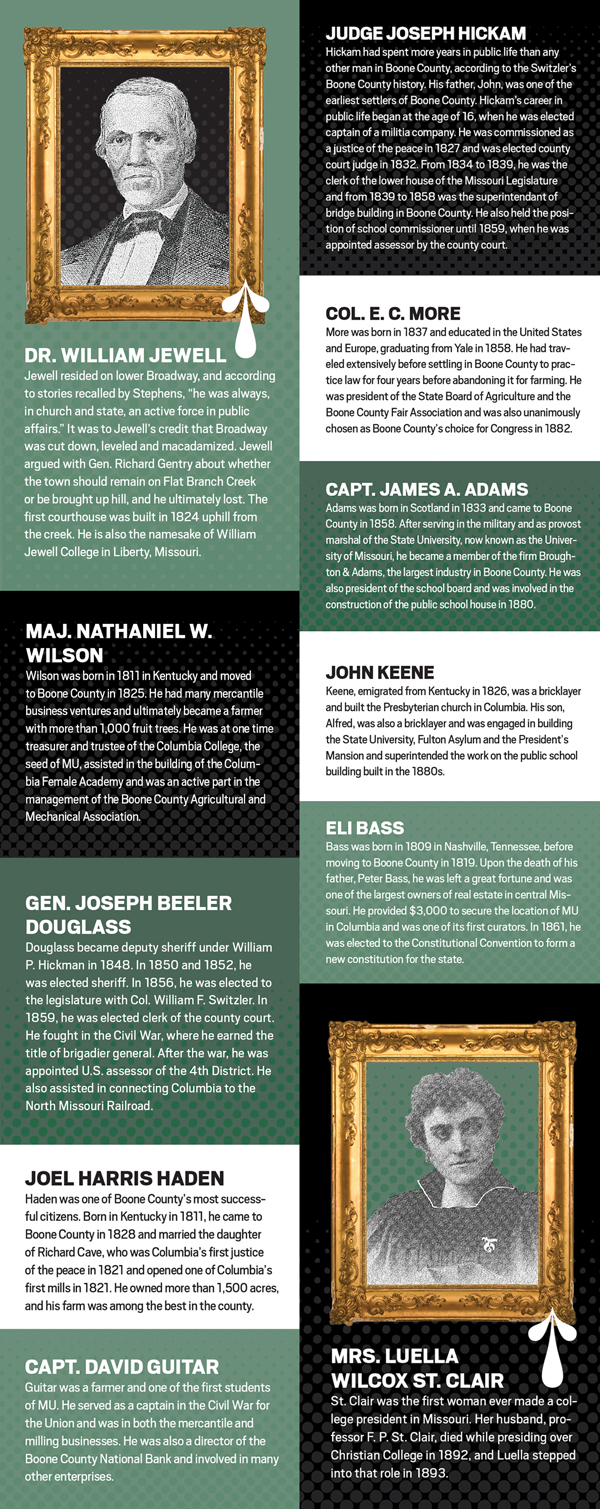Columbia’s Founding Fathers
When the earliest pioneers settled in Boone County, land coast between $2 and $6 per acre; corn, 20 cents per bushel; a cow, $9; and people lived in log cabins daubed with mud and covered with boards.
The settlers of Boone County came mostly from Virginia and Kentucky. Among the first were Robert Hinkson, who had a cabin where St. Charles Road crosses his namesake Hinkson Creek; Thomas and John Kennon; Dennis Callahan; James W. Fowler; Samuel Johnson; Robert Houston; and Joseph Persinger, the famous old hunter raised by Native Americans.
The county, sectioned off from Howard in 1820, was named for the great pioneer Daniel Boone. Columbia, however, wasn’t laid out until spring of 1821 when Gen. Richard Gentry, Judge David Todd and other citizens purchased the land on which Columbia is located from the federal government. There were only 15 homes in Columbia in the early 1820s.
Throughout the ’30s and ’40s, our forbearers laid the foundations of the Columbia we know today: they secured the University of Missouri’s location in Columbia, donated money for public education options and infrastructure improvements and set the plans for Columbia’s growth.
According to James L. Stephens, who recounted that period of Columbia history for the local newspaper, the Herald, in 1895, “The vantage ground they gave the county has remained with it until this day, and there has not been a time from that day to this that the community has not held a front rank in Missouri.”
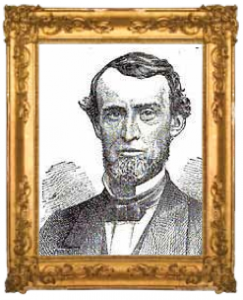
David H. Hickman
Hickman was “as useful and wise in his day as any citizen this county ever possessed,” according to Stephens. He was a member of the Missouri State Assembly from 1838 to 1842 and was instrumental in the founding of Stephens College when he helped secure the college’s charter in 1856 (then known as The Columbia Female Baptist Academy).
He was also president of the board of curators of Stephens College and a curator for MU. He also assisted in connecting Columbia to the North Missouri Railroad. Decades after his death in 1869, Hickman High School was built on his country estate in 1927.
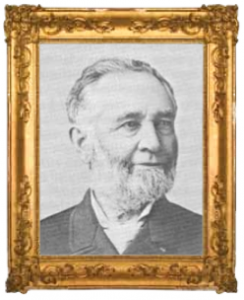
Gen. Odon Guitar
Guitar moved to Boone County in 1829 and attended the first session at MU in 1842. He served in the Mexican War and studied law in the office of his uncle, John Boyle Gordon, upon his return. He was commissioned brigadier general while fighting for the Union in the Civil War for “gallant and meritorious service in the field,” and he was also a “citizen of prominence,” according to Switzler. He was a part of the collection of citizens responsible for bringing the College of Agriculture to Boone County. He represented Boone County in the General Assembly from 1853 to 1858. He was also a member of the board of education and led Columbia Milling Co. During his time as a lawyer, only six of his clients were convicted.
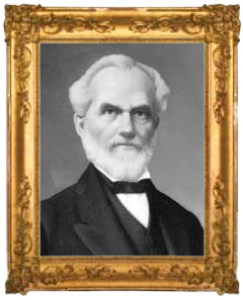
John Hiram Lathrop
Lathrop was the first president of MU in 1841. “The presence of the University wrought a beneficial effect in many ways and lifted the community to a higher plane,” said Stephens in his recollections. Lathrop served for nine years in that role before accepting a position at Wisconsin University.
He was succeeded by James Shannon, W. W. Hudson, professor G. H. Matthews and B. B. Minor before returning to the university after the Civil War in 1865. After his death in 1866, Lathrop was succeeded by Daniel Read, S. S. Laws, M. M. Fisher, J. S. Blackwell and Richard Henry Jesse.
Jesse also contributed a great deal to the university during his presidency from 1891 to 1908. He convinced the curators to rebuild in Columbia after Academic Hall burned, leaving the columns behind, in addition to creating summer school and the athletic department and quadrupling MU’s income.
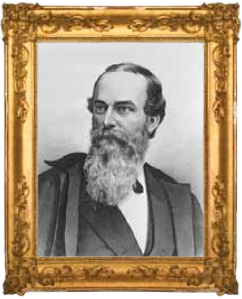
Maj. James Sidney Rollins
Rollins is often credited as “The Father of the University of Missouri.” Rollins, a state legislator, drafted a bill that was ultimately passed and brought Missouri’s state university to Columbia. He also founded the College of Education, raised money for the president’s home and established MU as the state’s federal land grant institution. He was the president of the MU Board of Curators from 1869 to 1886. According to Stephens, “he was always foremost in every important public movement” and was an accomplished orator and public leader. He also assisted in connecting Columbia to the North Missouri Railroad.
Rollins’ son George Bingham Rollins was a director of Boone County National Bank and Boone County Milling and Elevator Co. He was also a member of MU’s Board of Curators.
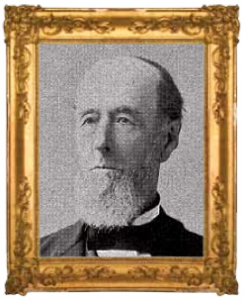
James L. Stephens
Stephens moved to Boone County with his father in 1819 from Kentucky. He was a well-known merchant of three stores — in Mexico, Fulton and Columbia — and the first to bring the concept of a cash-only store to Columbia in 1843, which was known then as “one of the most notable business events of the period,” according to Switzler. He was considered a principal citizen of Columbia in the mid-1880s.
“Few, if any, of Columbia’s business men have done more to extend the business of Columbia. None has been more generous towards public improvements,” according to the Herald. During his life, he donated more than $100,000 to various causes, including the gravel road system, and the construction of railroads, churches and schools. He was also involved in bringing the College of Agriculture to Columbia and connecting Columbia to the North Missouri Railroad. As a curator of MU, he was involved in selecting a number of early leaders of the university. He beat out J.M. Proctor, one of the most prominent and successful businessmen in the county, for the State Senate in 1880. He is also the namesake of Stephens College, having donated $20,000 to the school. After his initial donation, he remained actively involved in fundraising for the college.
His son Edwin Stephens was also known as one of Columbia’s foremost citizens. He began the Columbia Missouri Herald in 1870, was president of the Missouri Press Association and was an “active factor in the educational uplift of his state,” according to the Centennial History of Missouri by Walter Barlow Stevens.
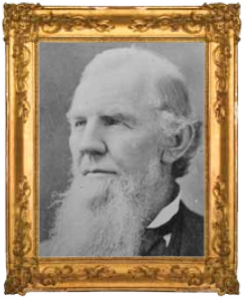
Col. William F. Switzler
Switzler was a journalist, author, orator, politician and public servant. Born in 1819, he moved from Kentucky with his parents, Simeon and Elizabeth Switzler, in 1826. He worked in the law office of Maj. James S. Rollins. In 1841, he became the editor of Columbia’s Patriot newspaper and in 1843 changed its name to The Missouri Statesman as its co-owner. He also gained great renown for his coverage of the Civil War and served on the MU Board of Curators, where he was involved in the selection of a number of MU’s early leaders. He was also involved in bringing the College of Agriculture to Columbia and connecting Columbia to the North Missouri Railroad, as well as the creation of Christian Female College and Stephens College. In 1856, he was elected to the legislature with Gene. Joseph Beeler Douglass. He also wrote a book covering Boone County’s history in 1882.
His eldest son, Irwin, became proprietor of the Statesman in 1881.
Judge David Todd
Todd, born in the 1780s, was among the first settlers of Columbia. Throughout Columbia’s early years, he and members of his family served in various roles to assist in Columbia’s growth and prominence. He was among the five trustees of the Smithton Co., the company that first established the town of Smithton, Columbia’s predecessor. According to Stephens, Todd was “a very able man” and an “enlightened judge and accomplished politician.” He was the judge of the Circuit Court from 1819 to 1837. He also served as a trustee for Columbia College in 1833 and presided over the laying of the cornerstone of MU. A portrait of Todd, done by George Caleb Bingham, still hangs at the university.
His son, Robert B. Todd, served as a second lieutenant in the Boone Guards to keep the county safe and served later on the Supreme Court of Louisiana.
John Boyle Gordon
Gordon came to Boone County in 1826 from Kentucky and was one of the “ablest lawyers and orators,” according to Stephens. Gordon entered politics immediately after moving to Boone County and was elected to the legislature for five terms. He and James S. Rollins worked together to secure Columbia as the location of MU.
He was one of the leading members of the Missouri bar and was recognized as the first orator of the state. He also assisted in connecting Columbia to the North Missouri Railroad, was a trustee of Columbia College, and was recognized as one of the city’s principal people in 1830 by the Herald’s historic edition. He had six children, and his sons, Boyle and Wellington, followed in his footsteps and became lawyers. Boyle married Ann Gentry, the daughter of Col. Richard Gentry.
His father, David Gordon, was one of the first pioneers of Columbia.
Maj. Gen. Richard Gentry
Gentry was one of the most prominent characters of Boone County’s early history. Born in Kentucky in 1788, he had 18 siblings, many of whom were also prominently connected to the “political history and the financial, commercial and other vital interests of the state,” according to Switzler. He was a member of the Smithton town company, Columbia’s predecessor.
“The history of the services of Gen. Gentry is so interwoven with the history of Boone County…that it would be a work of superogation to write it here,” Switzler reported.
He received various commissions for his military service, the first at age 19. He came to Boone County in 1820 and was the state senator from this district from 1826 to 1830. In 1830, he was appointed postmaster. He was also a trustee for Columbia College (not present-day Columbia College), the seed of MU in the 1830s. Also in the 1830s, Gentry was successfully engaged in the Santa Fe trade.
In 1837, he died in the Battle of Okeechobee in Florida with the Seminole Indians. Upon his death, personal friend and U.S. Sen. Col. Thomas H. Benton secured the position of postmistress for Richard’s wife, Ann. The first postmistress in the country, she held the position for more than 30 years.
His son, Judge Thomas B. Gentry, was known as one of Columbia’s leading citizens, according to the Herald. He served as head clerk of the post office during the Civil War, and was justice of the peace from 1868 to 1878. He was also a trustee of MU for 10 years and twice served as the chairman of the board and treasurer for five years. He was also the first school board president in 1873.
He is buried in Jefferson Barracks in St. Louis.
Maj. Gen. John Ellis
Ellis came to Boone County with his parents in 1818. He served as a caption under Maj. Gen. Richard Gentry in the Florida War in the late 1830s and as a colonel in the Mormon War shortly after. In 1842, he was appointed to the board of curators of MU. In 1846, then a major general, Ellis raised troops from Boone County for the Mexican War and led more than 100 local men to protect Santa Fe traders. He also served as public administrator for 10 years, as justice of the peace from 1844 to 1878 and on the committee to select Boone County representatives for the State Convention. According to Switzler, who wrote a history book about Boone County in 1882, “Few men in Boone County have been more active in public affairs.”
OTHER CITIZENS OF PROMINENCE:
ONLINE EXCLUSIVES:
William Babb
Babb was elected to public administrator of Boone County in 1876. He graduated law school at MU as valedictorian. He was one of the most well-known men in Boone County.
Robert Barr
Barr assisted with the charter of Columbia College in the 1830s, which was the seed of MU. He was also considered one of the principal people in town in 1830 and ran a dry goods, grocery and general store.
William Cochran
Cochran was a trustee of Columbia College. He was also considered one of the principal citizens of Columbia in 1830. He was a reverend.
William Cornelius
Cornelius was also considered one of the principal citizens of Columbia in 1830. He owned a dry goods, grocery and general store and was also a trustee of Columbia College, the seed of MU.
Joseph Ficklin
Ficklin came to Columbia to serve as the department chair of math at Columbia College. From there, he was selected to head the same department at MU. He was responsible for solving a number of mathematics problems that had formerly never been solved.
Sinclaire Kirtley
Kirtley was also considered one of the most prominent citizens of Columbia in 1830. He was a lawyer and also served as one of the first trustees of Columbia College, the seed of MU.
B. McAlester
McAlester completed the majority of the woodwork at MU. He was also the architect of the Columbia’s public school, built in 1881, costing a little more than $11,000.
Oliver Parker
Parker owned a dry goods, grocery and general store and was also a trustee of Columbia College. He was considered one of the principal citizens of Columbia in 1830.
Malcolm Quinn
Quinn was born in 1844 in Randolph County, Missouri. In 1861, he was one of the corps of engineers that assisted with the North Missouri Railroad. In 1869, he was responsible for maintaining the gravel roads of Boone County and was later appointed county surveyor, deputy collector and county assessor. By trade, he engaged in real estate and insurance.
Anthony Rollins
Rollins was a trustee of Columbia College and was elected president of the board.
James Shannon
Shannon was heavily involved in the charter of Christian Female College. He also served as the second MU president.
Alexander F. Stephens
Stephens was born in 1828 and settled with his family in Boone County in 1839. He farmed 1,100 acres and was one of the wealthiest men in the county.



